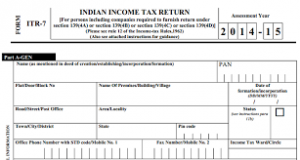In this blog post, Shuaib Ahmed Saifi, a student studying at Dr. Ram Manohar Lohiya National Law University, Lucknow and pursuing a Diploma in Entrepreneurship Administration and Business Laws by NUJS, describes the process of filing for the return of income.
What is the return of income?
In Indian law the tax liability is twofold, one, the payment of the income tax on the total income and second, disclosing the details of income through various sources, the taxable and non-taxable income and giving details about the total tax. The second liability is called the return of income. Thus, the taxpayer’s responsibility is not only limited to the payment of tax but also disclosing to the Government the details of the income.
The return of income can simply be seen as a balance sheet of the income and the tax that is due on such income. The details of one’s income from various sources, tax liability thereon, the details of tax paid and any refunds that have to be given by the government is simply the return of income. Section 139 of the Income Tax Act, 1961 deals with the return of income. According to this section every person whose income has exceeded the non-taxable income limit is liable to file a return of income before a specified date in a specified manner, the details of which are given in the Act. The filing of return is proof that one has an income for which the tax had been paid. The income tax return is a standard proof of income, and it establishes a record with the tax department.
Who should file an Income Tax Return?
Any individual who has a taxable income is bound by law to file a tax return.  Tax return has to be filed irrespective of the fact that one has paid the tax. If the employer deducts tax and submits it even, in that case, one has to file the tax return. As mentioned earlier that the tax liability is twofold. Currently, income above Rs.2 Lacks is taxable.
Tax return has to be filed irrespective of the fact that one has paid the tax. If the employer deducts tax and submits it even, in that case, one has to file the tax return. As mentioned earlier that the tax liability is twofold. Currently, income above Rs.2 Lacks is taxable.
It is not that people with lower incomes cannot file a tax return. Anyone who has any income, even within the exemption limit, can file an income tax return. Although such a person is not legally bound to do it and no penalty would be faced by such person who otherwise would be faced by persons with income above exemption limit.
Why should one file a return of income?
The return of income is to be filed as a legal liability. The income tax mandates persons who have income above the exemption limit to file a return of income u/s 139 of the Act. The persons who do not file a return of income can face prosecution, scrutiny, penalties and interests.
However, there are other benefits also. Firstly, the filing of returns helps in adjusting the accounts with the Government. If there is any extra tax paid then, it can be refunded by the Government only after the filing of the return. If any loss is accrued in a year, then the filing of return helps in reducing the tax which the IT department otherwise would charge based on the information submitted in previous. Thus, it becomes necessary for a business person to file returns regularly in case the revenues are not steady.
Another important benefit of filing returns is that it serves as a proof of income. The return of income is a recognized proof of income and is used by almost every authority that needs to verify the income of a person. This proof, in turn, helps in various ways, which are:
- Loans- Bank grants loans only after a proper scrutiny of the income of the person. The bank wants to be sure of the sources of income as they want to be assured that the loan will be repaid. Thus, without a return of income file, it is difficult to get loans.
- Insurance/Accidental claims- The courts take into consideration the income of the person while awarding claims. In such cases, the courts consider the return of income as the proof of income and award the claims accordingly.
- Obtaining Visa, Government tenders, jobs, startup funding, etc., require the proof of income which the return of income is.
What are the different modes of filing return of income?
There are many modes to file a return of income. The mode depends on upon the need of the person filing. If the return of income is relatively simple, i.e., the person has only one or two sources of income then the person can file the return himself without any aid of professionals like Chartered Accountant or Tax Advocate. Depending upon the feasibility, the person can file the return on the online platform or can use the traditional paper method. In the following paragraphs, the different modes are discussed separately.
There are three options that a person has while filing for returns, these are:
- Self-Filing: One can file the returns directly. There are two ways of doing it, online or physically/paper based. However, the offline submission can only be made if the income is less than Rs. 5 lacs and there is no refund claimed. Also, there should not be any income located abroad to file returns offline. The relevant forms can be filled up and can be submitted to the Income Tax office of relevant jurisdiction. Upon submission, a duly stamped and numbered acknowledgment slip should be collected by the person filing the return. In the case of online submissions, one can do it in two ways, partially online and completely online. This will be discussed in detail later. This method of filing return is apt for people who have simple, one or two, sources of income and who do not require any professional consultation.
- Tax Return Preparers: The tax return preparers are appointed under a scheme by the Government. People who find it difficult to understand the nuances of the documents/papers/forms the tax return preparers are appointed to help such people. A tax return preparer can be located in any area using the website www.trpscheme.com. After submitting the relevant information on this website a tax return preparer can be found. The tax return preparers charge fees for filing the returns. While filing the return through a tax return preparer, one should check the details of the return preparers as the identification number, name and counter signature on the form.
- Chartered Accountant: In simple cases where the income sources are simple and limited to one or two the need for a CA does not arise. However, in complicated cases where there are tax audits, multiple sources, deductions, etc. are involved consulting a Chartered Accountant becomes a necessary. The CA charges fees for this work. Checking the credentials of the CA is suggested.
Returns can also be filed through two platforms. There are two platforms that can be used the online and offline platforms. Although some smart phone apps have also come up for filing the returns, there have very limited usage and are thus not of major importance. The filing of the return on the official website is the widely used and most apt way to file the return.
Filing return online can be done in two ways; one is completely online and the other partially. In the completely online method, the person has to log into the website with a user ID and password after creating an ID. After logging in the user has to select the required form and fill up the details on the site and submit. This will complete the filing of return.
In the partially online method, the person has to download the relevant ITR form. Then the form has to be filled up, and a file has to be generated. Then the person has to log into the website and upload the filled up form and submit it.
The offline method is the traditional method of filing a return. The relevant form has to be filled up by hand; all the documents are to be attached, and the form is then to be submitted to the office of the IT department physically. This method is time and effort demanding. It is totally upon the preferences of the person to decide the mode of filing the return.
Thus, the filing of return of income is a legal duty, and the person needs to file it before the expiry of the period. The filing of return also has other benefits as has been mentioned above. The filing process has been simplified over the years. The online submission of the ITR also helps in reducing the usage of paper and promotes e-governance.
 Serato DJ Crack 2025Serato DJ PRO Crack
Serato DJ Crack 2025Serato DJ PRO Crack








 Allow notifications
Allow notifications



Great Article.